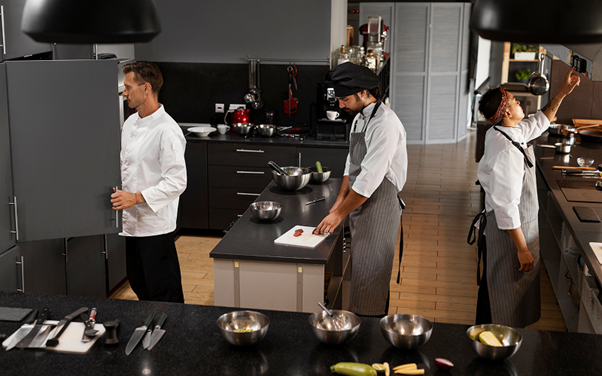Maintaining high standards of food safety is essential in Singapore’s dynamic food and beverage industry. Whether you run a hawker stall, café, catering business, or a central kitchen, understanding the importance of proper practices helps protect public health and ensures regulatory compliance. For many food handlers, securing a food hygiene certificate in Singapore is the first step towards achieving that standard.
Why Food Hygiene Matters
Food hygiene plays a critical role in preventing foodborne illnesses and ensuring that what reaches the consumer is safe to eat. In a densely populated country like Singapore, any food safety lapse can have wide-reaching consequences. Contaminated food not only puts consumers at risk of illness but also threatens business reputation and operational licences.
The Singapore Food Agency (SFA) has implemented strict measures to monitor hygiene standards. Food establishments are graded based on inspection outcomes, and consumers often refer to these grades when choosing where to dine. A strong hygiene culture goes beyond inspections—it begins with the knowledge and responsibility of every individual handling food.
Core Principles Of Food Hygiene And Handling
Understanding and implementing best practices for food hygiene and handling is essential for anyone working in food preparation. These principles help reduce contamination and keep food safe from preparation to service.
The first important principle is personal hygiene. Food handlers must wash their hands thoroughly with soap and water before starting work, after using the restroom, or after handling raw ingredients. Fingernails should be trimmed, and jewellery avoided, to prevent the transfer of bacteria.
Another crucial aspect is temperature control. Bacteria multiply quickly in the danger zone between 5°C and 60°C. To avoid this, cooked food should be kept above 60°C and chilled food below 5°C. When reheating, ensure that food reaches at least 75°C to kill any harmful bacteria.
Cross-contamination is also a major concern. Separate chopping boards, utensils, and storage containers should be used for raw and cooked foods. Cleaning and sanitising work surfaces regularly is a must, especially between tasks involving raw meats and ready-to-eat items.
The Importance Of Certification And Training
Obtaining a food hygiene and handling certificate is not merely a box to tick for food handlers—it’s a structured learning journey that equips individuals with the knowledge to manage food safely and hygienically. The Workforce Skills Qualifications (WSQ) system, administered by SkillsFuture Singapore, offers the “WSQ Food Safety Course Level 1,” which is mandatory for all new food handlers.
This course covers topics such as proper handwashing techniques, temperature management, personal cleanliness, and cross-contamination prevention. Upon completion at a training facility, participants are awarded a certificate that is valid for five years, after which a refresher course is required to stay updated with new standards and practices.
Mid-career switchers, aspiring hawkers, and anyone entering the food service industry benefit greatly from this training. It fosters a sense of accountability and promotes a consistent approach to hygiene across different food sectors.
Practical Measures In Food Establishments
Day-to-day practices in food establishments must reflect the training obtained through certification. For example, food handlers should regularly monitor and log temperatures of refrigerators and hot holding equipment. Items should be labelled with expiry dates and stored using the first-in, first-out (FIFO) method to minimise waste and avoid spoilage.
Pest control is another key aspect. Crumbs, food spills, and improper waste disposal attract pests, which are vectors of disease. Regular inspections and preventive measures, such as sealing gaps and installing traps, are necessary to maintain a pest-free environment.
Food safety audits and internal checklists help reinforce hygiene practices. Managers should conduct spot checks and provide feedback to ensure standards are upheld. This creates a culture where food safety becomes a shared responsibility, not just a management concern.
Staying Compliant With Singapore’s Regulations
Singapore has comprehensive legislation in place to regulate food safety. The Environmental Public Health Act mandates the possession of a valid food hygiene certificate in Singapore for all food handlers. Non-compliance can result in fines, suspension of operations, or revocation of licences.
Inspections by the SFA are thorough and unannounced. Establishments must be prepared at all times by maintaining high cleanliness levels and ensuring all staff are trained. The Food Hygiene Officer (FHO) scheme, required for medium and large food establishments, designates specific personnel to oversee hygiene matters and conduct in-house training.
Building Trust Through Good Hygiene
Having proper food hygiene systems in place builds consumer trust. In an age where online reviews and food ratings can make or break a business, a single hygiene lapse can lead to negative publicity and reduced patronage. On the other hand, good hygiene can be a unique selling point. Displaying your outlet’s cleanliness grade, maintaining visible handwashing facilities, and showing evidence of training instil confidence in customers.
A renewed food hygiene and handling certificate not only keeps you compliant but also shows your commitment to public safety and professionalism. Consumers today are more informed and discerning, and they appreciate businesses that take hygiene seriously.
Conclusion
Food hygiene is not just a requirement—it’s a cornerstone of Singapore’s food industry. Following best practices, maintaining daily discipline, and investing in proper training ensures that food remains safe and establishments remain trusted. As regulations evolve and customer expectations rise, staying informed and certified becomes ever more important.
To learn more about hygiene courses or get assistance in applying for your food hygiene certificate in Singapore, feel free to contact Avanta Academy today.

